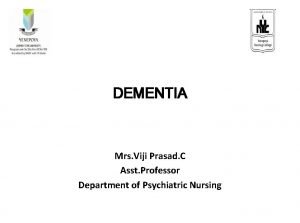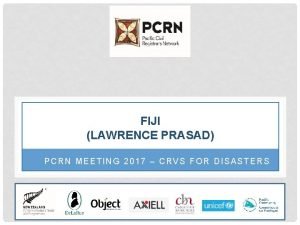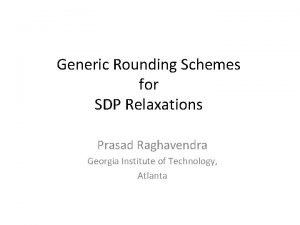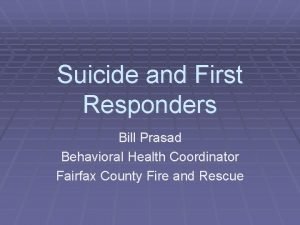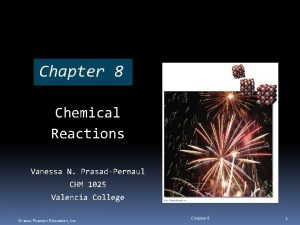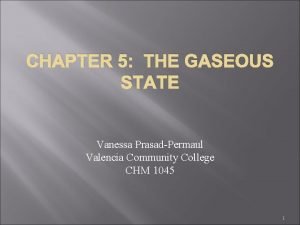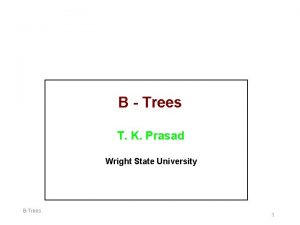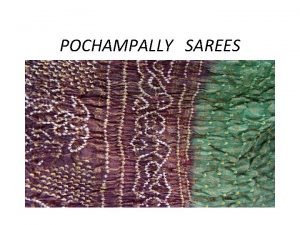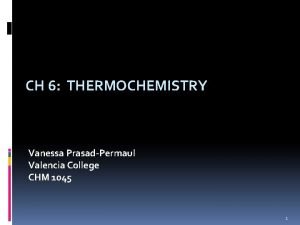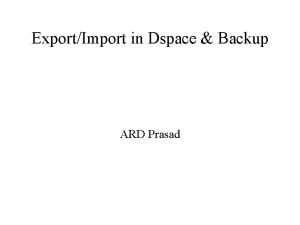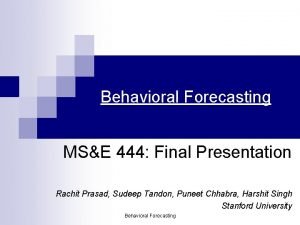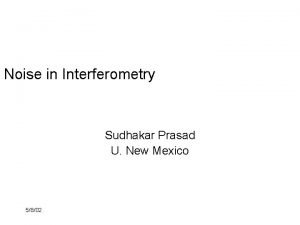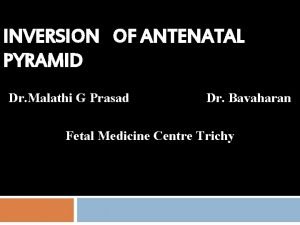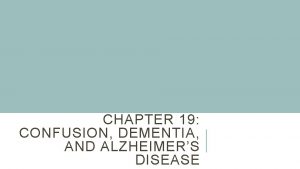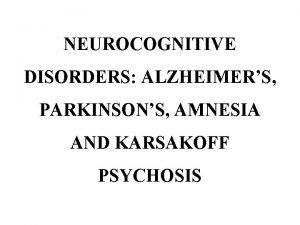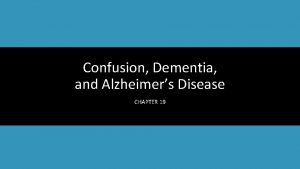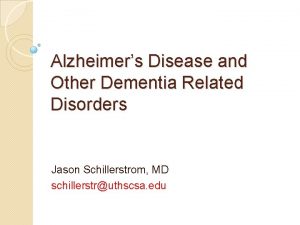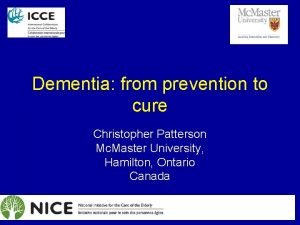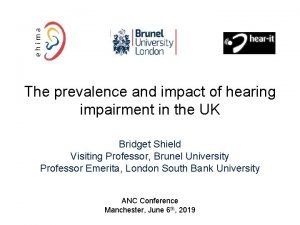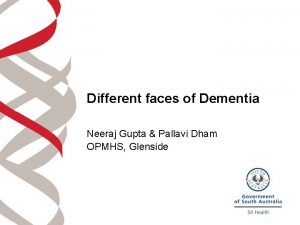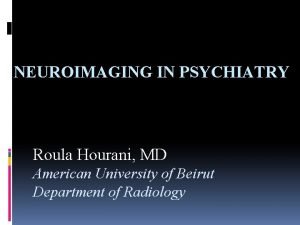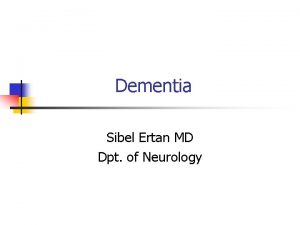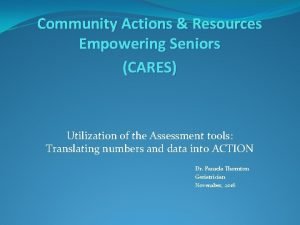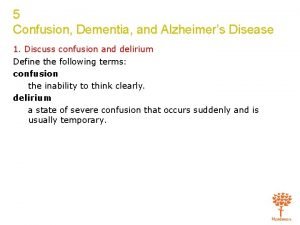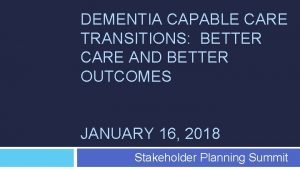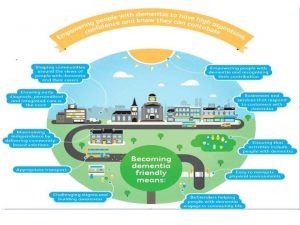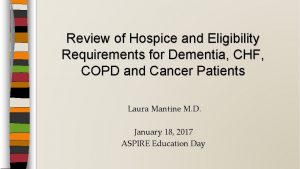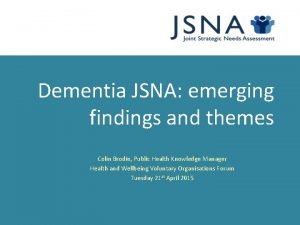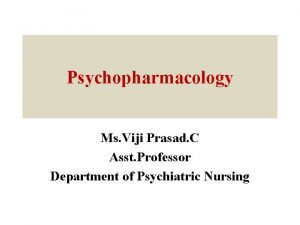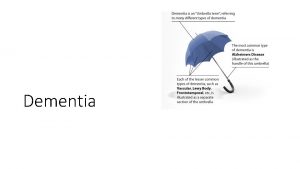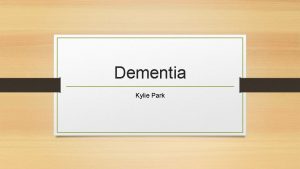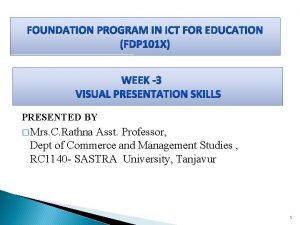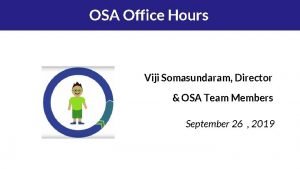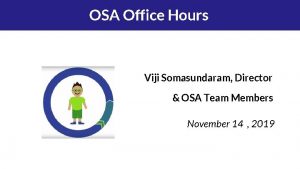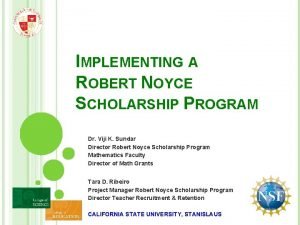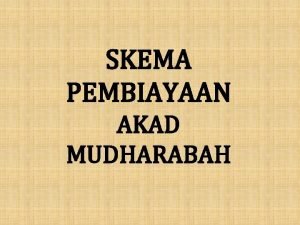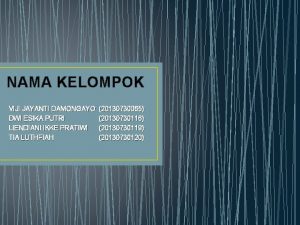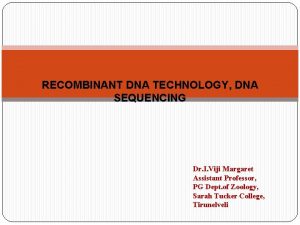DEMENTIA Mrs Viji Prasad C Asst Professor Department




























































- Slides: 60

DEMENTIA Mrs. Viji Prasad. C Asst. Professor Department of Psychiatric Nursing

INDIAN MENTAL HEALTH ACT (1987)

Introduction • In our country plenty of legal orders interact with mental disorders in order to protect the interests of mentally ill, society and the state. • There are guidelines regarding restrain, admission and discharge, procedures of civil and criminal action with regard to mentally ill.

HISTORY • Indian Lunacy Act, Act 4 of 1912, replaced the Indian Lunatic asylum Act, Act 36 of 1858. • After 40 years of Independence, the Mental Health Bill, 1987 was passed by Rajya Sabha on 26 th November 1986 and Lok Sabha on 19 th march 1987.

• The amendments made by the Lok Sabha were agreed to by the Rajya Sabha on 22 nd April 1987. • After it was amended to on 22 nd may 1987, it became Act no. 14 of 1987. But it came into effect in all the states and union territories of India in April 1993.

Definition of the Act • "An act to consolidate and amend the law relating to the treatment and care of mentally ill persons, to make better provision with respect to their property and affairs and for matters connected therewith or incidental thereto. "

Objectives of the Act • To establish central and state authorities for licensing and supervising the psychiatric hospitals. • To establish such psychiatric hospitals and nursing homes.

Contd… • To provide for the custody of mentally ill persons who are unable to look after themselves and are dangerous for themselves and or, others. • To protect the society from dangerous manifestations of mentally ill.

• To regulate procedure of admission and discharge of mentally ill persons to the psychiatric hospitals or nursing homes either on voluntary basis or on request. • To safeguard the rights of these detained individuals. • To protect citizens from being detained unnecessarily.

Cont…. • To provide for the maintenance charges of mentally ill persons undergoing treatment in such hospitals. • To provide legal aid to poor mentally ill criminals at state expenses.

• Mental Health Act is divided into 10 chapters consisting of 98 sections.

Chapter I • It contains preliminary information. Some definitions included in this area are: • “Cost of maintenance ” in relation to a mentally ill person admitted in a psychiatric hospital or psychiatric nursing home , shall mean the cost of such items as the State Government may , by general or special order , specify in this behalf;

• “Inspecting officer” means a person authorized by the state Government or by the licensing authority to inspect any psychiatric hospital or psychiatric nursing home • “License” means a license granted under section 8 • “Licensee” means the holder of a license.

• “Licensed psychiatric hospital “or “licensed psychiatric nursing home” means a psychiatric hospital or psychiatric nursing home as the case may be licensed, or deemed to be licensed, under this Act. • “Mentally ill person” means a person who is in need of treatment by reason of any mental disorder other than mental retardation.

• “Mentally ill prisoner : means a mentally ill person for whose detention in, or removal to, a psychiatric hospital, psychiatric nursing home , jail or other place of safe custody , an order referred to in section 27 has been made; • “Minor”means a person who has not completed the age of eighteen years.

• “Psychiatric hospital” or “psychiatric nursing home ”means a hospital or , as the case may be, a nursing home established or maintained by the Government or any other person for the treatment and care of mentally ill persons and includes a convalescent home established or maintained by the Government or any other person for such mentally ill persons.

• Psychiatrist ”means a medical practitioner possessing a post –graduate degree or diploma in psychiatry, recognized by the Medical Council of India , constituted under the Indian Medical Council Act, 1956.

• “Reception order” means an order made under the provisions of this act for the admission and detention of a mentally ill person in a Psychiatric hospital/nursing home. • “Relative” includes any person related to the mentally ill person by blood , marriage or adoption.

CHAPTER II • Deals with the procedures for establishment of mental health authorities at central and state levels. • A central authority for mental health services is envisaged, under the central Government, with the following main functions.

• In – charge of regulation, development, direction and co-ordination with respect to mental health services under the Central Government. • Supervision of Psychiatric hospitals, nursing homes and other mental health service agencies under the Central Government,

CHAPTER III • It provides guidelines for establishment and maintenance of psychiatric hospitals/nursing homes. • The central and the state Government is empowered to establish or maintain Psychiatric hospitals and nursing homes for;

Ø admission Ø treatment Ø care of mentally ill persons • There is a provision for a licensing authority and license will be valid for a maximum period of 5 years, after which it has to be renewed.

CHAPTER IV • It deals with the procedures for admission and detention in psychiatric hospitals/ nursing homes.

Admission on Voluntary Basis • Any person (not being a minor), who considers himself to be a mentally ill person and desires to be admitted to any psychiatric hospital or psychiatric nursing home for treatment , may request the medical officer in charge for being admitted as a voluntary patient

Request by guardian for admission of a ward. • Where the guardian of a minor considers such minor to be a mentally ill person and desires to admit such minor in any psychiatric hospital for treatment, he may request the medical officer –in-charge for admitting such minor as a voluntary patient.

Admission Under Special Circumstances • Any mentally ill patient who is unwilling for admission on a voluntary basis may be admitted and kept in a psychiatric hospital/ nursing home. • For such purpose an application should be made out on his/her behalf by a relative or friend of the mentally ill person, provided the medical officer deems fit.

Admission under Reception Order. • Only a relative not other than husband, wife, guardian or a friend can make out an application for the admission of a mentally ill patient. Such an application should be made out to the magistrate in writing supported by two medical certificates, one of them issued by a Gazetted medical officer.

• However, no person being a minor or one who has not seen the mentally ill patient in the last 14 days can make such an application. • The patient may now be admitted after the magistrate obtains consent from the medical officerin charge of the mental hospital.

• The medical officer in-charge can extend inpatient treatment to more than 6 months by making such an application to the magistrate.

• On production before the magistrate Mentally ill patients exhibiting violent behavior, creating obscenes and dangerous to the society can be detained by the police officer and produced in court within 24 hours of such detention, supported by two medical certificates, subsequent to which the magistrate issues a reception order.

Admission in emergencies • The medical officer in-charge may order the admission of a mentally ill patient if he thinks he is dangerous to himself or others.

• However the patient should be produced before the magistrate within 24 hours (maximum time limit is 72 hours, which is exclusive of the examination period), or the magistrate himself visit the psychiatric hospital and pass reception order on examination.

Temporary Treatment Order • It is an order issued by the magistrate in cases where the risk is perceived to the patient’s life or to that of others. • If the medical officer-in charge feels it IS necessary to bring legal authorities into the picture he can do so by applying to the magistrate.

• Alternatively the relatives can get the magistrate to issue an order for treatment. • In such case a single medical certificate is required which is valid for 6 months.

• Admission of Mentally Ill Prisoners A mentally ill prisoner may be admitted into a mental hospital on the order of the presiding officer or a court. • Miscellaneous Admission A mentally ill patient can be admitted either on humanitarian grounds (e. g. , wanderers) or for observation purpose.

Chapter V • It deals with the Procedure to be followed for the discharge, leave of absence and removal of mentally ill persons. • Part I - Inspection • Part II - discharge • Part III - Leave of absence • Part IV - Removal.

Inspection • Inspection at least once in every month. • At least 3 visitors should be present at the joint inspection. • Write their remarks in the visitor’s book regarding management and conditions of such hospital or nursing home and of the inpatient thereof.

• Shall not inspect any personal records of an inpatient which, in the opinion of the medical officer incharge, are confidential in nature.

• The medical officer in charge of a Psychiatric hospital/nursing home, where a mentally ill prisoner is admitted, shall submit a special report regarding the mental and physical condition of such person once in every 6 months.

Leave of absence • It can be granted to any inpatient (except a mentally ill prisoner) on application by the petitioner/ applicant (for admission) or by a near relative, on entering a bond (with or without sureties) with the medical officer in-charge.

• The maximum period of such leave is 60 days. In case the medical officer in charge refuses to grant the leave of absence, the applicant may apply to the Magistrate who is empowered to grant or refuse such leave.

• If a mentally ill persons (except a mentally ill prisoner )escapes from a psychiatric hospital /nursing home, he can be recaptured by authorized persons, only within 1 month of the date of escape.

Discharge of a patient Admitted on voluntary basis • Medical officer in-charge of psychiatric hospital/nursing home on recommendation from two medical practitioners preferably a psychiatrist, can issue directions for discharge of the patient.

Discharge of a patient admitted under special circumstances • A relative or friend may make an application to the medical officer for care and custody of the patient. • The relatives are required to furnish a bond with or without sureties, along with an undertaking that the mentally ill person shall be prevented from causing injury to self or others

Discharge of a patient admitted on reception order • An applicant who feels that the patient has recovered from illness may make an application for discharge to the magistrate. • A certificate should accompany such an application from medical officer in-charge of the psychiatric hospital/nursing home.

Discharge of a patient admitted by police • In cases where the police detain the mentally ill individual in hospital, he may discharged after the family members agree in writing to take proper care, and the medical officer in-charge opines that he is fit to be discharged.

Discharge of a mentally ill prisoner • The hospital authorities have to report every month about the person’s state of mind to the authority, which had ordered detention. • As soon as they find that the trial, they have to inform about the same to the authority concerned. The person is then handed over to the prison officer for further legal action

CHAPTER VI • Judicial enquiry regarding mentally ill persons possessing property, their custody and management of property. • The application for holding an inquisition into the mental condition of such persons may be made by any of his relatives, or a public curator, or the Advocate General of the state, or the District Collector (When property involves land).

• The District court can order for appointment of a Guardian (if incapable of looking after his property) or a manager (if incapable of looking after only his property but can look after himself).

Chapter VII • It deals with ways and means to meet the cost of maintenance of mentally ill persons detained in psychiatric hospital/nursing home.

Chapter VIII • It is the latest addition to the act, which provides for the protection of human rights of mentally ill person. These rights include: • 1. Mentally ill person shall not be subjected during treatment to any indignity (physical or mental) or cruelty

2. Mentally ill person under treatment shall not be used for the purpose of research unless such research is of direct benefit to him for diagnosis or treatment or Written consent has been obtained from the patient (if a major voluntary patient) or from the guardian/ relative (if minor or incompetent)for such research.

3. No letter or communication sent by or to a mentally ill person shall be intercepted, detained or destroyed.

CHAPTER IX • It deals with procedures and penalties, which can be relatively severe and explicit, for contravening them. • E. g; For improper reception of mentally ill person, imprisonment up to 2 years or fine of one thousand rupees or both may be given.

CHAPTER X • It deals with miscellaneous issues, clarification pertaining to certain procedures to be followed by the medical officer –in-charge of the psychiatric hospital/nursing home.

• The medical officer in charge of a psychiatric hospital or psychiatric nursing home shall, as soon as may be, after any mentally ill person detained therein has been discharged make a report in respect of his mental and physical condition to the authority under whose orders such person had been so detained.

POSITIVE ASPECTS OF THE ACT

• Replacement of offensive terminologies of Indian Lunacy act 1912 by new soft and soothing terms. Thus upholding the dignity of mentally ill persons. • Establishment of licensing authorities to provide a check on licensing and working of mental health hospitals. This will help in improving standards of mental health care.

• Provision for establishment of new hospitals. • Provision for out- patient care thus avoiding unnecessary detention. • Simple procedures for admission and discharge of mentally ill persons to hospitals. • Appointment of guardians for maintaining property and person of mentally ill.

• Provision for bearing the expenses of treatment by relatives and government. • Prohibition on any research on such subjects without proper consent. • Provision for separate places for children, addicts and convicted persons.
 Admission under reception order
Admission under reception order Promotion from associate professor to professor
Promotion from associate professor to professor Mrs. darling was ___________ of mrs. s.
Mrs. darling was ___________ of mrs. s. They are mrs garcia and mrs castro
They are mrs garcia and mrs castro They are mrs garcia and mrs castro
They are mrs garcia and mrs castro Lawrence prasad
Lawrence prasad Prasad raghavendra
Prasad raghavendra Bill prasad
Bill prasad Srinivas kantipudi
Srinivas kantipudi Chandi prasad bhatt quotes
Chandi prasad bhatt quotes Vanessa prasad
Vanessa prasad Vanessa prasad permaul
Vanessa prasad permaul Tk prasad
Tk prasad Rajesh prasad ias assam
Rajesh prasad ias assam Amita prasad ias
Amita prasad ias Edamana prasad
Edamana prasad Spread of chipko movement
Spread of chipko movement Pochampalli fill in the blanks
Pochampalli fill in the blanks Vanessa prasad permaul
Vanessa prasad permaul Annie prasad
Annie prasad The gita project
The gita project Dr prasad gourineni
Dr prasad gourineni Dspace backup and restore
Dspace backup and restore Engage global solutions
Engage global solutions Astha prasad
Astha prasad Vasudeva prasad atluri
Vasudeva prasad atluri Rachit prasad
Rachit prasad Sudhakar prasad
Sudhakar prasad What can we learn privately
What can we learn privately Dr.malathi prasad trichy
Dr.malathi prasad trichy Prasad sandireddy
Prasad sandireddy Prasad calyam
Prasad calyam Prasad calyam
Prasad calyam Life story work dementia
Life story work dementia Chapter 19 confusion dementia and alzheimer's disease
Chapter 19 confusion dementia and alzheimer's disease Types of amnesia
Types of amnesia Dementia pictures
Dementia pictures Chapter 19 confusion dementia and alzheimer's disease
Chapter 19 confusion dementia and alzheimer's disease Frontotemporal dementia
Frontotemporal dementia Fast dementia scale
Fast dementia scale Rarly signs of dementia
Rarly signs of dementia Dementia treatments and interventions near patterson
Dementia treatments and interventions near patterson Hearing impairment disability
Hearing impairment disability Reversible dementia
Reversible dementia Rocking chair therapy for dementia patients
Rocking chair therapy for dementia patients Receptive language
Receptive language Dementia bookcase analogy
Dementia bookcase analogy Trasodone
Trasodone Fast score for dementia
Fast score for dementia Confusion dementia and alzheimer's disease
Confusion dementia and alzheimer's disease Living well with dementia scotland
Living well with dementia scotland Dementia care mapping checklist
Dementia care mapping checklist Dementia 2015
Dementia 2015 Unit 40 dementia care
Unit 40 dementia care Pool activity level (pal) checklist
Pool activity level (pal) checklist Dementia capable care
Dementia capable care Dementia care bath
Dementia care bath Fast score hospice
Fast score hospice Dementia
Dementia Reversible dementia
Reversible dementia Dementia
Dementia
